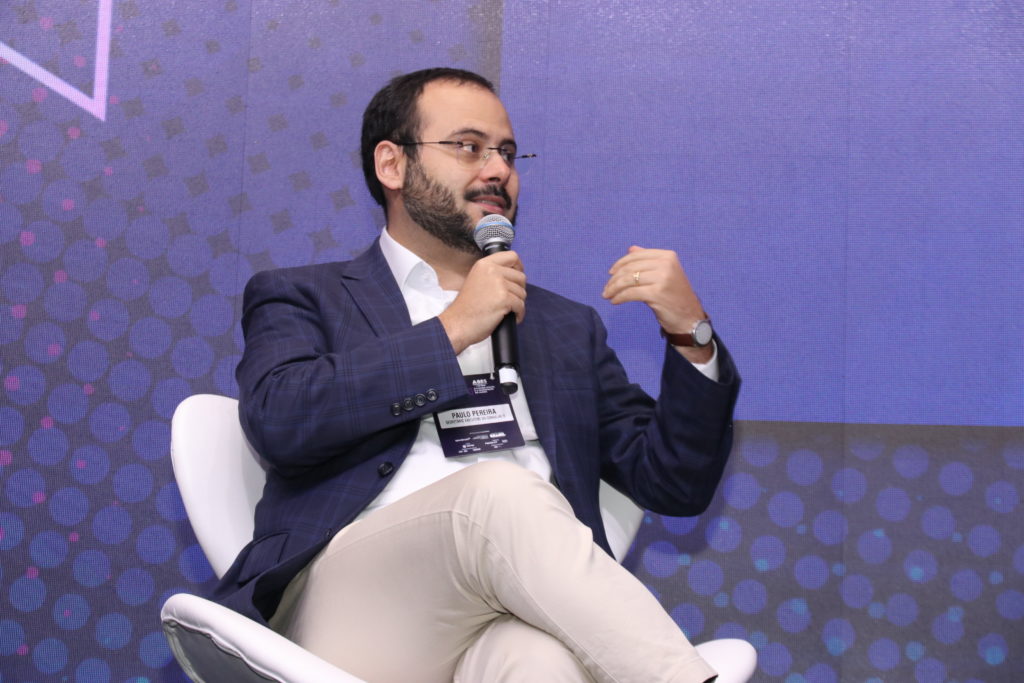
The theme "Regulation, Public Policies and Innovation – The Challenge of Getting the Right Step” was part of the debates at the 13th edition of ABES CONFERENCE, held in São Paulo and which brought together important experts. A hybrid and free event, the conference had as its central theme “The Digital Future and the Reinvention of Now and debated many subjects, such as the innovation ecosystem, artificial intelligence, the future of work, fostering innovation and sustainability. It was sponsored by ApexBrasil, TOTVS, AWS, Prosper Tech Talents, Caesbra, NIC.br and SND Distribuidora.
Technology is advancing rapidly around the world and, in most cases, regulation cannot keep up with this rapid pace. But, it is necessary to answer the question: “how is it possible to get things right in the short, medium and long term, at a time when it is necessary to regulate the use of new technologies, such as artificial intelligence?

Paulo Pereira,
Government technological transformation refers to the adoption and implementation of advanced technologies to improve public sector efficiency, transparency, and service delivery. This transformation involves the application of digital solutions and the use of data to improve decision-making and interaction with citizens. For Paulo Pereira, Executive Secretary of the Council for Sustainable Economic and Social Development – Ministry of Institutional Relations, ABES has been a strong partner for the federal government in providing information for the construction of public policies for the technology sector. “The technological transformation we are experiencing is the same as the transformation of writing. It is difficult to imagine the world we know without writing. Most scientific and technological advances throughout history are directly or indirectly associated with the storage and transmission of information. So how can a country have a strategy for this new world? Here a range of opportunities opens up and for this it is necessary to exchange experiences to build appropriate strategies”, he pointed out.
Eliana Azambuja, Interim Director of the Department of Science, Technology and Digital Innovation at MCTI-Ministry of Science, Technology and Innovation, comments that “a big challenge in assimilating the speed of technology is keeping public policies updated to keep up with changes. We are at a time to update our digital transformation and Artificial Intelligence policies. And while we review, it is necessary to take some strategic actions such as building an AI observatory, which will bring a lot of information to the government, maintaining collaboration on all sides, as well as seeking to train people for these new technologies”.
 According Priscila Reis, Lawyer Specialist in Technology, Co-founder of Layer Two Consultoria, Master in Intelligence Technology with an emphasis on Artificial Intelligence, Brazil is one of the 28 signatory countries that seeks to join forces for ethical AI. “Companies want to get into AI, but they need to educate the people who are using this technology. It is necessary to think about its use policy as well as follow all the steps of the regulatory process. Brazil is not yet on the list of large companies, but we are ethically following the entire transformation in this segment”.
According Priscila Reis, Lawyer Specialist in Technology, Co-founder of Layer Two Consultoria, Master in Intelligence Technology with an emphasis on Artificial Intelligence, Brazil is one of the 28 signatory countries that seeks to join forces for ethical AI. “Companies want to get into AI, but they need to educate the people who are using this technology. It is necessary to think about its use policy as well as follow all the steps of the regulatory process. Brazil is not yet on the list of large companies, but we are ethically following the entire transformation in this segment”.
Second Diogo Costa, Executive Director of the Millennium Institute, it is necessary for Brazil to adopt a less rigorous approach when regulating artificial intelligence (AI). He highlighted as a reference the measures and initiatives adopted by the United States Department of Commerce in collaboration with certification bodies, such as ISO. “We are a developing economy, so we must keep an eye on how standardization can make our regulations more defined and assertive.”
This Round Table was moderated by Andriei Gutierrez, Vice-President and Leader of the ABES Regulatory Committee, who commented that, with all the advancement in technology, it is possible to observe that the country is moving “from a predominantly industrial community to a predominantly digital society. This is very important because it transforms all social relationships.”














